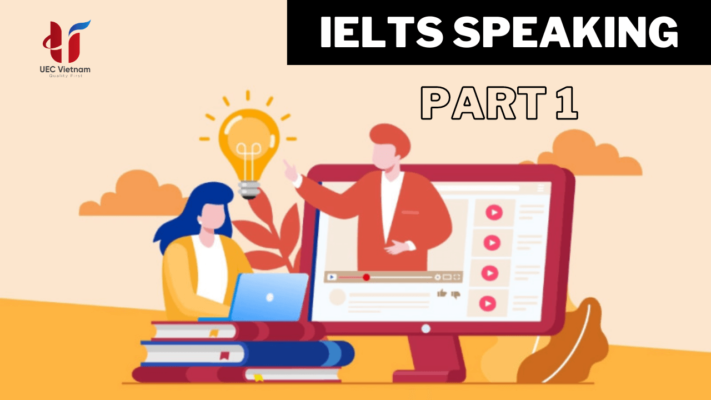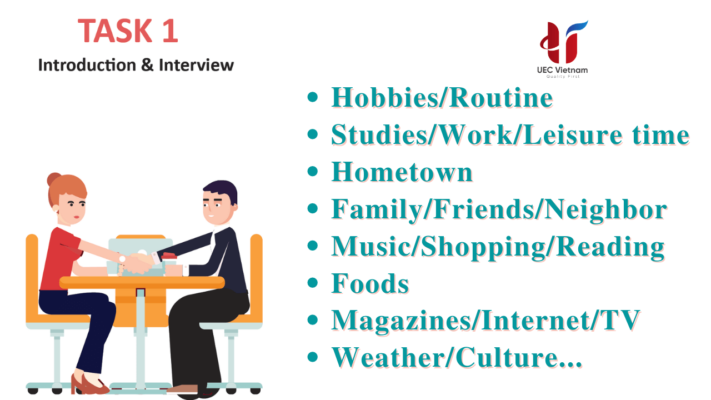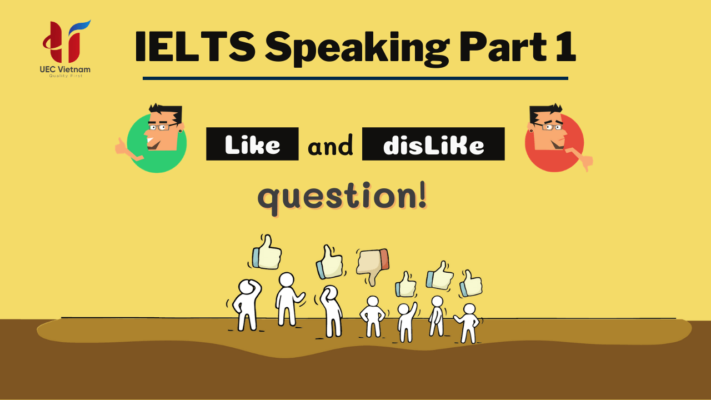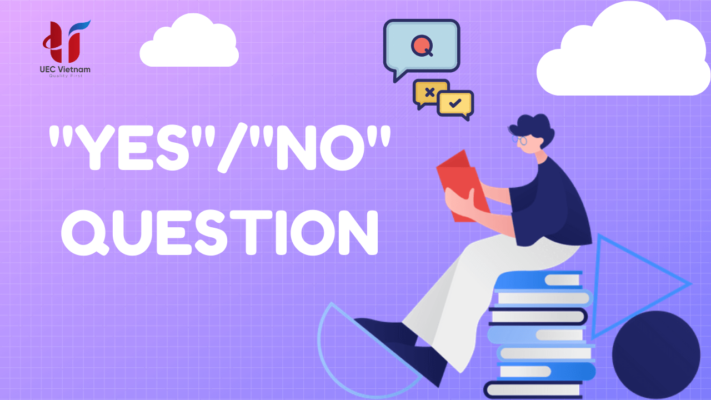Trong Part 1 của phần thi Speaking, các bạn sẽ được hỏi các câu hỏi mang tính cá nhân về các chủ đề quen thuộc, ví dụ như hometown, family, job, study, hobby,… và rất nhiều chủ đề khác. Phần này giống như một cuộc phỏng vấn nhỏ để giám khảo biết những thông tin cơ bản về thí sinh và chủ yếu mang tính “break the ice”, giúp thí sinh đỡ ngại ngùng và căng thẳng. Hôm nay, TA – địa chỉ học luyện thi IELTS ở tại Đà Nẵng sẽ hướng dẫn trả lời IELTS Speaking Part 1 chi tiết nhất nhé!

Mục lục bài viết
Tổng quan IELTS Speaking
1. Tìm hiểu về IELTS Speaking
Trong phần thi Speaking, giám khảo sẽ đánh giá khả năng diễn đạt ý kiến và truyền tải thông tin của thí sinh đồng thời kiểm tra khả năng nói dài và sử dụng ngôn ngữ phù hợp về chủ đề được đưa ra
Đây KHÔNG phải là bài thi:
→ Kiểm tra xem bạn đã nhớ được bao nhiêu câu trả lời
→ Kiểm tra khả năng dùng các từ khó, cao cấp
→ Kiểm tra xem bạn biết được bao nhiêu thì và cấu trúc ngữ phấp
→ Kiểm tra giọng bạn là giọng Anh hay giọng Mỹ
Đây LÀ bài thi:
→ Kiểm tra khả năng giao tiếp bằng Tiếng Anh của bạn
2. IELTS Speaking Part 1
a. Cấu trúc bài thi Speaking
|
Phần |
Thời gian |
Nội dung |
|
Phần 1: Giới thiệu và phỏng vấn |
4 – 5 phút |
|
b. Tiêu chí chấm điểm
→ Fluency And Coherence – Độ trôi chảy và mạch lạc
→ Lexical Resource – Khả năng sử dụng vốn từ vựng
→ Pronunciation – Phát âm
→ Grammatical Range And Accuracy – Độ chính xác và sự đa dạng trong ngữ pháp
c. Các chủ đề thường gặp và cách trả lời IELTS Speaking Part 1

Cách để trả lời IELTS Speaking Part 1 một cách “xịn xò” chính là sử dụng công thức A.R.E.A nhé.
Đó là:
A – Answer: Đưa ra câu trả lời
R – Reason: Đưa ra lý do cho câu trả lời.
E – Example: Đưa ra ví dụ cụ thể
A – Alternatives: Có thể đưa ra ý kiến phản bác cho câu hỏi.
Hướng dẫn trả lời IELTS Speaking Part 1 chi tiết
1. Dạng Like/Dislike Questions
Example: “Is there anything you don’t like about your hometown?”

Đối với dạng câu hỏi này, điều quan trọng nhất mà bạn cần tránh là sử dụng những từ ngữ đơn giản như: like, dislike, love, hate, enjoy,… Bạn có thể thay thế bằng những từ sau:
| Like | Dislike |
|
|
Ta có thể trả lời câu hỏi trên theo cấu trúc như sau:
| Structure | Example | Answer |
| 1. Starting phrase |
|
|
| 2. Liking / Disliking phrase | Sử dụng những cụm từ tương tự trong bảng trên |
|
|
3. Introduce a specific type (Cụ thế hóa câu trả lời) |
|
|
|
4. Reason (Đưa ra lý do tại sao bạn like/dislike..) |
|
|
|
5. Introduce second point (Mở rộng thêm ý) |
|
|
2. “Basic Description” Questions
Example: “Tell me about your hometown.”
Một câu hỏi rất cơ bản phải không? Nhưng bạn hãy nhớ rằng, giám khảo KHÔNG đặt ra câu hỏi đó để biết thêm thông tin về quê hương bạn. Thực chất, họ đang kiểm tra khả năng sử dụng Tiếng Anh của bạn, cụ thể là: Hãy cho tôi biết khả năng miêu tả của bạn về quê hương mình và trình bày các từ vựng liên quan đến nó.
Bạn sẽ không đạt được band điểm cao nếu bạn tập trung trả lời những ý chính như:
- Câu trả lời quá ngắn và trực tiếp
- Không sử dụng linking words, phrases, idioms, redundant language
- Từ vựng, ngữ pháp, cấu trúc câu quá đơn giản
Ta có thể trả lời câu hỏi trên theo cấu trúc như sau:
| Structure | Example | Answer |
| 1. Opening phrase |
|
“Well as you can probably guess I come from Hanoi and I have lived here all rny life, although at the moment I’m studying in another city. |
| 2. 1st pointing phrase + Linking phrase + Point 1 |
|
I suppose if I had to describe Hanoi, the first thing I would say is that its absolutely enormous, maybe even one of the biggest cities in South East Asia I guess. It’s so big in fact that even the locals have problems finding their way around. |
| 3. 2nd pointing phrase + Linking phrase + Point 2 |
|
Another significant characteristic is that it offers examples of both classical and contemporary architecture. Actually some of Vietnam’s most renowned landmarks are “slapbang” in the middle of Hanoi. |
| 4. 3rd pointing phrase + Linking word/phrase + Point 3 |
|
… |
3. “Types of” Questions
Example: Tell me about the different/What types of public transport in your city?
Ta có thể trả lời câu hỏi trên theo cấu trúc như sau:
| Structure | Example | Answer |
| 1. Opening phrase |
|
Of course, it goes without saying that there’s quite a mixed variety of public transport in my city. |
| 2. Overall |
|
Of course, it goes without saying that there’s quite a mixed variety of public transport in my city. |
| 3. Linking phrase + 1st point |
|
Though I think the most commonly-used would potentially be buses. |
| 4. Details |
|
And the explanation for this could be that they are so cheap and reliable. The average bus fare in my city is about one yuan for a single journey. |
| 5. Linking phrase + 2nd point |
|
As wen as buses, a second variety of public transport would be something like taxis. |
| 6. Details |
|
And one exceptional aspect with taxis is that they are certainly the quickest way to get around town. So if you’re in a hurry then taxis are the best bet (= the best choice). |
| 7. Ending |
|
Likewise, as might be expected, there’s things like ferries, motorcycle taxis and trains, although these are not as widely-used as the first two that I mentioned. |
4. “Wh-/How often” Questions
Example: “How often do you go to the cinema?”
Với một số câu hỏi IELTS như: “Who do you spend your weekends with?”, “When do you listen to music?”, các thí sinh thường gặp phải vấn đề là họ trả lời quá “cụt lủn”, ví dụ như: “In the evenings before I sleep”, “Once/Twice/… a week”, “With my parents or my friends”,…
Rõ ràng đó không phải là câu trả lời ăn điểm. Bí quyết cho câu hỏi này là bạn cần trả lời từ 2-3 câu khác nhau về what, where, how often,… Bạn nên sử dụng cấu trúc “it depends” để tạo ra một tương quan đối lập “situational contrast” trong câu trả lời.
| Structure | Example | Answer |
| 1. Opening phrase |
|
Well to be honest, I think I would have to say that it really depends. |
| 2. “Depends” phrase |
|
Well to be honest, I think I would have to say that it really depends. |
| 3. Linking phrase + 1st point |
|
Like for instance, if I have the money, then it, quite possible that i will watch a movie in the cinema, two or three times a month. You know cinema tickets are pretty pricey in China. |
| 4. Two different situations |
|
Like for instance, if l have the money, then it’s quite possible that I will watch a movie in the cinema, two or three times a month. You know cinema tickets are pretty pricey in China. |
| 5. Compare linking phrase |
|
Whereas in contrast, if I’m broke, it, more likely that I watch movies at home on DV. You probably know that DVDs are quite cheap here, especially compared to the price of a cinema ticket. |
| 6. Two another different situations |
|
Whereas in contrast, if I’m broke, it’s more likely that I watch movies at home on DVD. You probably know that DVDs are quite cheap here, especially compared to the price of a cinema ticket. |
5. “Yes/No” Questions
Example: “Is healthy eating important?”
Ở những câu hỏi “Yes/No” (“Is education free in your country?”, “Do you think you are an ambitious person?”, “Can you play a musical instrument?”), thí sinh cũng gặp vấn đề tương tự như với dạng câu “Wh-/How”: trả lời đi thẳng vào “Yes” hoặc “No” rồi sau đó triển khai thêm một số ý. Cách trả lời đó không sai, nhưng thường chúng cũng không gây ấn tượng với các giám khảo với cấu trúc câu quá đơn giản, đại trà.

Một bí kíp hướng dẫn trả lời IELTS Speaking Part 1 cho bạn đó là hãy trả lời cả “Yes” và “No”. Cách trả lời “nước đôi” như vậy giúp bạn có thêm “đất diễn” để trình bày được nhiều cấu trúc câu phức tạp và từ vựng phong phú hơn.
Bây giờ ta thử áp dụng bí kíp đó để trả lời câu hỏi mẫu nhé:
| Structure | Example | Answer |
| 1. Opening phrase |
|
Well in actual fact if I think about it I guess that in many ways its fairly important especially when you consider that a healthy diet can help to prevent a variety of diseases and health problems such as diabetes and obesity. |
| 2. Linking structure + “Yes” answer |
|
Well in actual fact, if I think about it, I guess that in many ways it, fairly important; especially when you consider that a healthy diet can help A prevent a variety of diseases and health problems such as diabetes and obesity. |
| 3. Linking structure + “No” answer |
|
But you also have to understand that eating unhealthy food in moderation is not overly harmful. In fact unhealthy food is often tastier than healthy food so I guess it’s fine to eat a little junk food now and then. |
| 4. Ending |
|
So all in all I guess my answer would have to be yes and no. |
6. “Would” Questions
Example: “What would you like to change about your city?”
Đối với phần lớn các câu hỏi “Would”, bạn nên sử dụng Câu Điều kiện loại II để trả lời:
If + past simple + would/could/might + infinitive verb
→ Well, to be quite honest with you, I don’t think I’ve ever thought about that. But I guess, If I had a chance I would consider to move to another place someday.
Bên cạnh đó, hãy thêm cả những cấu trúc câu phủ định để câu trả lời đa dạng hơn. Tuy nhiên, hãy tránh trả lời kiểu như “I never thought about it”, thay vào đó bạn có thể dùng:
- Well, quite honestly I don‘t think ever thought about that, but I guess…
- Actually, this isn’t something that I’ve ever considered, but in short…
- I’m not really sure how to put this, but I suppose generally speaking…
Example: “What would you like to change about your city?”
→ Well, to be quite honest with you, I don’t think I’ve ever thought about that. But I guess, If I had a chance I would choose to upgrade our public transport system. This is because I want to solve traffic congestion in big cities like Hanoi or Ho Chi Minh by encouraging more people to take public transportation.
Như vậy, chúng ta đã hoàn thành được 6 dạng câu hỏi trong IELTS Speaking Part 1 với những câu trả lời mẫu chi tiết. Hi vọng với bài viết này, TA Đà Nẵng đã giúp bạn sẽ có được cái nhìn khái quát nhất cho các dạng câu hỏi IELTS Speaking – Part 1 và hướng dẫn trả lời IELTS Speaking Part 1 một cách chi tiết. Bạn nhớ luyện tập thật nhiều để nắm vững kiến thức hơn và đạt kết quả trong kỳ thi IELTS sắp tới nhé!!!
Xem thêm >>>
- Cách chấm điểm IELTS Speaking
- Các Kênh Luyện Khả Năng Speaking
- Tự học IELTS Speaking
- Luyện thi IELTS Speaking có gì cần lưu ý?
Trung Tâm Luyện Thi IELTS Uy Tín Ở Tại Đà Nẵng

